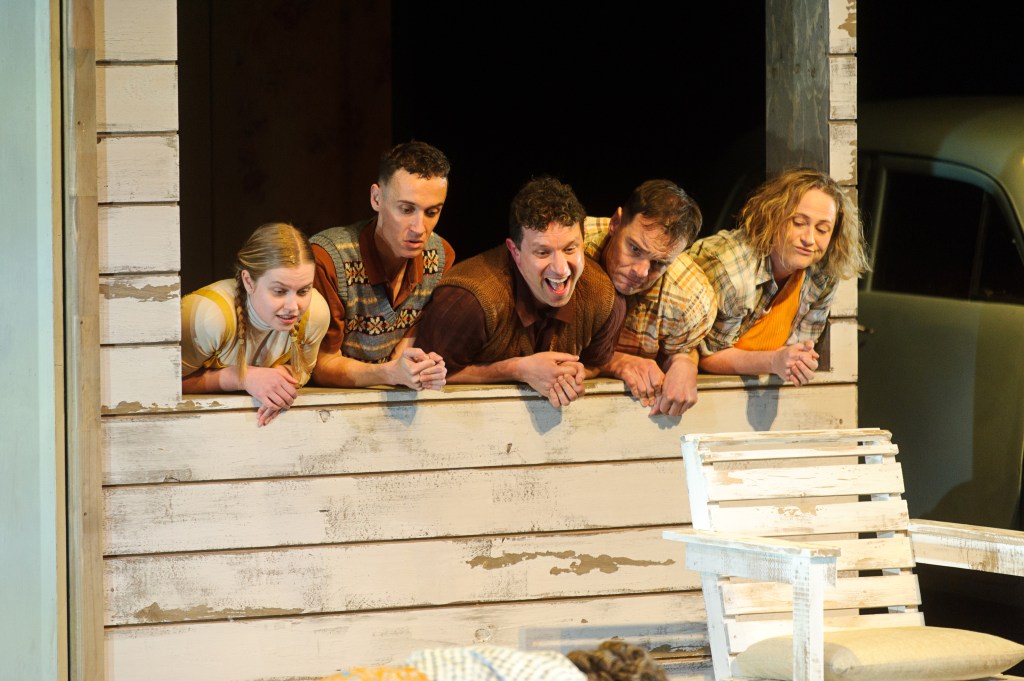Based on Patricia Cornelius’ semi-autobiographical book of the same name, My Sister Jill is the latest endeavour from the powerhouse partnership of Cornelius and director Susie Dee, marking nearly 40 years of their artistic alliance .
With a 95-minute run sans interval, the play quickly and episodically takes us through the dysfunctional life of one Australian family. Set in suburban Melbourne from the 1950s to the 70s, My Sister Jill is bookended by WWII and the Vietnam War, but between these two global upheavals is a battleground fought within the home.
Father Jack (Ian Bliss), is an ex POW suffering from PTSD and his rages thunder throughout the modest, weatherboard house with its peeling paint and faded wallpaper, perfectly realised by designer Marg Horwell. The children – there are five – dance on a knife’s edge when he is around. Jack is a quintessential ocker Aussie: a good sort, cheeky and a bit of a larrikin, but in a heartbeat, and particularly with alcohol in the bloodstream, his mood can change – one moment proudly admiring his garden produce, the next screaming and walloping the kids for any minor infraction.
Bliss captures brilliantly the many nuances of this unsteady patriarch. It would be easy to portray him as an overbearing monster, but there are times beneath the bravura where vulnerability and decency remain and Bliss finds those moments and brings them fleetingly to the surface before the tide of rage-despair overwhelms him again.
As his constantly put-upon wife Martha, Maude Davey too is a revelation in her quiet dignity and love that is reminiscent of the fierce loyalty that Linda Loman has for her own troubled husband Willy in Death of a Salesman. In fact, there is a marked similarity between the two plays in some ways; if Miller wrote about a man straining under the purview of capitalism, here Cornelius is dealing with the aftershocks of war on another man. Both are assailed and assaulted by their memories.
Martha may be threadbare and exhausted with the demands of running a household and dealing with a pack of rowdy kids, but she is still protective of Jack and constantly reminding the brood of all that he’s been through. It is deeply sad how she begs for their kindness in the face of his emotional and physical abuse.
All the children are played by adults and, through their awkward, coltish mannerisms, bare knees and elbows and childish inflections, they are completely convincing. Their various sibling exploits, teasings and games add a much needed lightness to the play and prevent it from being overwhelmingly traumatic in tone.
Christine (Angourie Rice) is the youngest and, when the play opens, still sees her father as a heroic figure: ‘He’s a survivor… He lasted. He did. He came out the other side. He’s a remarkable man.’ She wants to be just like him and in her naivete of youth fails to see the dark, corrosive power that he wields over the family. All her games are re-enactments of his own derring-do wartime experiences, tales of which she begs to be told repeatedly. Rice, with her braided pigtails, saucer-eyed wonder and frenetic, chatterbox energy is a delight to behold as Christine and, through the play’s progression, we get to see her grow up and shed some of her insouciance for hard-earned wisdom.
Though the play is very much an ensemble piece; Cornelius and Dee allow each character to shine individually in a manner that’s almost filmic in execution. So we follow the closeness of twins Mouse (Zachary Pidd) and Door (Benjamin Nichol) and then witness how, decades later, their paths sadly diverge. And we see how the eldest boy Johnnie (James O’Connell), desperate for the (forever withheld) validation, respect and love from Jack, finally forges his own, uneasy path to adulthood.
Most of all though, we see the plight of eldest child Jill (Lucy Goleby). There’s no mistaking the fact that the play is named after her. She is the only one with the wits and courage to stand up to her father and Goleby puts in a sterling performance of steel and rebellion.
My Sister Jill aims for realism: the production is clothed in the dress of a lower middle income bracket of the 50s era by Horwell, with discreet lighting by Rachel Burke that includes a single poetic door light, and a simple but versatile set that has the façade lifted to include the interior of the house. On one side of the house rests a FJ Holden, that’s also integrated into the narrative.
Read: Theatre review: Taking Liberty, WA Maritime Museum
In such a short duration, the play economically explores a range of subjects, from the effects of war-afflicted neurosis and psychological damage, to the love and denial of parental love, the fusing and cutting of family bonds and the politics of conscription.
It marks another poignant and powerful collaboration by the winning team of Cornelius and Dee and should not be missed.
My Sister Jill
Southbank Theatre
Writer: Patricia Cornelius
Director: Susie Dee
Set and Costume Designer: Marg Horwell
Lighting Designer: Rachel Burke
Composer and Sound Designer: Kelly Ryall
Intimacy Coordinator: Amy Cater
Voice and Text Coach: Matt Furlani
Fight choreographer: Lyndall Grant
Cast: Ian Bliss, Maude Davey, Lucy Goleby, Benjamin Nichol, James O’Connell, Zachary Pidd, Angourie Rice
My Sister Jill will be performed until 28 October 2023.
